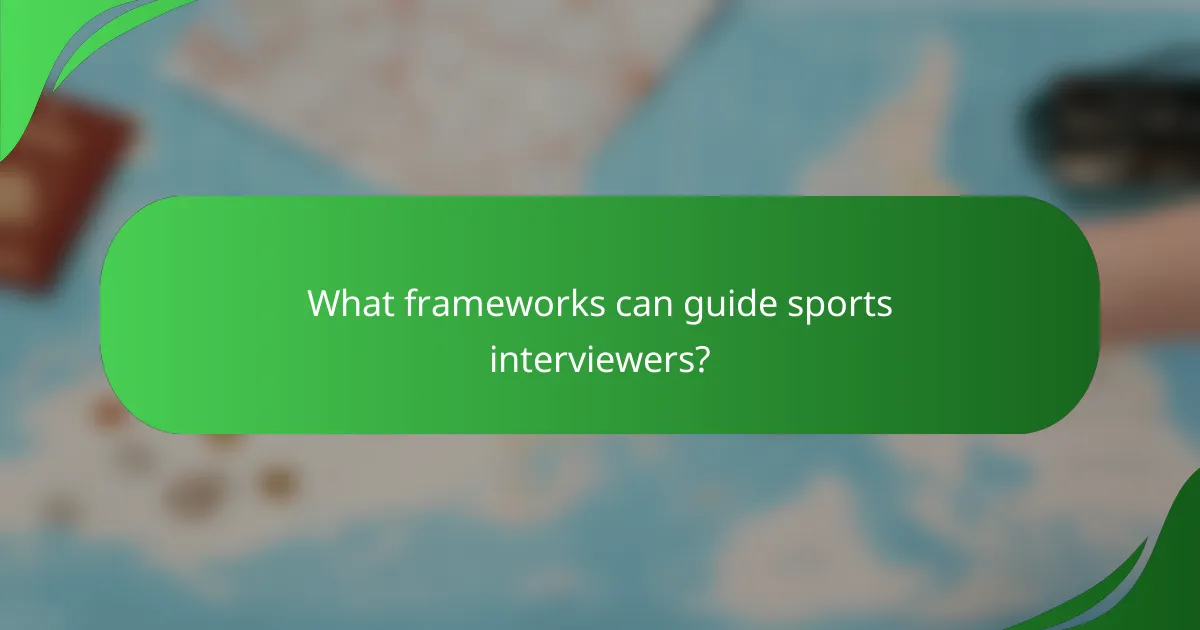Handling controversial topics in sports interviews demands a delicate balance of sensitivity and clarity. Interviewers must prepare thoroughly and remain aware of their audience to foster trust and ensure respectful dialogue. By prioritizing professionalism and empathy, journalists can navigate backlash effectively while maintaining constructive conversations.

How to Approach Controversial Topics in Sports Interviews?
Approaching controversial topics in sports interviews requires a careful balance of sensitivity and clarity. Interviewers should aim to address these issues thoughtfully while ensuring that the conversation remains respectful and informative.
Use neutral language
Using neutral language is essential when discussing controversial topics. This means avoiding emotionally charged words and phrases that could escalate tensions or lead to misunderstandings. For example, instead of saying “the scandal,” refer to “the situation” to maintain a more objective tone.
Neutral language helps create a safe environment for interviewees, allowing them to express their views without feeling attacked or defensive. This approach can lead to more productive conversations and deeper insights.
Prepare interviewees in advance
Preparing interviewees for discussions on controversial topics can significantly enhance the quality of the interview. Share potential questions or themes in advance, so they can formulate their thoughts and responses. This preparation can help them feel more comfortable and confident during the interview.
Additionally, informing interviewees about the context of the discussion can help them understand the audience’s perspective and tailor their responses accordingly. This preparation fosters a more constructive dialogue.
Focus on facts and statistics
When addressing controversial topics, grounding the conversation in facts and statistics is crucial. Presenting data can help clarify issues and provide a more objective basis for discussion. For example, citing relevant studies or statistics can illustrate the impact of a particular issue in sports.
Using credible sources for these facts is vital to maintain trust and credibility. Avoid cherry-picking data; instead, present a balanced view that considers multiple perspectives.
Encourage open dialogue
Encouraging open dialogue allows for a richer exploration of controversial topics. Create an atmosphere where interviewees feel free to share their opinions and experiences without fear of judgment. This can be achieved by asking open-ended questions that invite elaboration.
For instance, instead of asking, “Do you think this issue is a problem?” consider asking, “What are your thoughts on how this issue affects the sport?” This approach can lead to more insightful and nuanced discussions.
Practice active listening
Active listening is a key skill when handling controversial topics in interviews. It involves fully concentrating on the interviewee’s words, understanding their message, and responding thoughtfully. This practice not only shows respect but also encourages interviewees to share more openly.
To practice active listening, maintain eye contact, nod in acknowledgment, and paraphrase what the interviewee has said to confirm understanding. This technique can help clarify points and demonstrate genuine interest in their perspective.

What are the best practices for sports journalists in the UK?
Sports journalists in the UK should prioritize thorough preparation, audience awareness, and professionalism when handling controversial topics. These practices help ensure balanced reporting and foster trust with audiences.
Research background information
Before conducting interviews on controversial subjects, journalists must gather comprehensive background information. This includes understanding the history of the issue, key players involved, and previous public reactions. Familiarity with past incidents can guide the journalist in framing questions appropriately.
Utilizing reliable sources such as academic articles, reputable news outlets, and expert opinions can enhance the journalist’s knowledge base. This preparation allows for informed discussions and helps avoid misrepresentations.
Understand audience sensitivities
Recognizing the sensitivities of the audience is crucial when addressing controversial topics. Different demographics may have varying perspectives based on cultural, social, or regional factors. Journalists should consider these differences to avoid alienating segments of their audience.
Engaging with audience feedback and monitoring social media discussions can provide insights into prevailing sentiments. This understanding helps journalists tailor their approach and select language that resonates positively with their viewers.
Maintain professionalism
Professionalism is essential in sports journalism, especially when discussing contentious issues. Journalists should remain objective, avoiding personal biases that could skew the narrative. This includes using neutral language and allowing interviewees to express their views fully.
Additionally, maintaining a respectful tone, even in disagreement, fosters constructive dialogue. Journalists should also be prepared to handle backlash gracefully, ensuring that their responses align with ethical standards and uphold the integrity of their profession.

How to handle backlash from controversial questions?
Handling backlash from controversial questions requires a thoughtful approach that prioritizes empathy and clarity. Being prepared to address negative reactions can help maintain a constructive dialogue and protect your reputation.
Respond with empathy
When faced with backlash, responding with empathy is crucial. Acknowledge the feelings and perspectives of those affected by the question, demonstrating that you understand their concerns. This can help defuse tension and foster a more open conversation.
For example, if a question about a sensitive topic elicits a strong reaction, you might say, “I understand why this issue is important to many people, and I appreciate your passion.” This approach shows respect and can lead to a more productive exchange.
Clarify intent behind questions
Clarifying the intent behind controversial questions can help mitigate backlash. Clearly explain why the question was asked and what you hope to achieve through the discussion. This transparency can help the audience see the bigger picture and reduce misunderstandings.
For instance, if a question touches on a divisive issue, you might say, “I asked this to highlight the ongoing conversation about this topic and to understand different viewpoints.” This helps frame the discussion in a constructive light.
Issue public statements if necessary
In some cases, it may be necessary to issue public statements to address backlash. If the response to a question escalates or misinterpretations spread, a clear and concise statement can clarify your position and intentions.
When crafting a public statement, focus on key points and avoid lengthy explanations. For example, a simple statement could read, “I appreciate the feedback regarding my recent comments and want to clarify my stance on this issue.” This shows accountability and a willingness to engage with the audience’s concerns.

What frameworks can guide sports interviewers?
Sports interviewers can benefit from frameworks that emphasize ethical considerations and structured decision-making. These frameworks help navigate controversial topics while maintaining professionalism and respect for all parties involved.
Utilize ethical journalism standards
Adhering to ethical journalism standards is crucial for sports interviewers, especially when addressing sensitive issues. Key principles include accuracy, fairness, and accountability. Interviewers should strive to present facts without bias and give all relevant voices a chance to be heard.
For example, when discussing a player’s off-field behavior, it’s essential to verify information before broadcasting it. This not only protects the integrity of the interview but also respects the individuals involved.
Implement a decision-making matrix
A decision-making matrix can help interviewers evaluate the potential impact of their questions and topics. This tool allows them to weigh factors such as public interest, potential harm, and the relevance of the issue to the sport. By categorizing issues, interviewers can prioritize which topics to address and how to approach them.
For instance, a matrix might include columns for the topic’s sensitivity, audience reaction, and the athlete’s willingness to discuss it. This structured approach can guide interviewers in crafting questions that are both engaging and respectful.

What are the emerging trends in sports interviews?
Emerging trends in sports interviews include a heightened emphasis on mental health discussions and the integration of social media for immediate audience engagement. These trends reflect a shift in how athletes communicate their experiences and how fans interact with sports narratives.
Increased focus on mental health topics
The conversation around mental health in sports has gained significant traction, with athletes openly discussing their struggles and the importance of mental well-being. This trend encourages a more supportive environment, allowing players to share their experiences without stigma.
Interviews now often include questions about mental health, prompting athletes to address issues like anxiety, depression, and the pressures of competition. For example, discussing coping strategies or the role of mental health professionals can provide valuable insights for both fans and fellow athletes.
Use of social media for real-time feedback
Social media platforms have transformed sports interviews by allowing fans to provide immediate feedback and engage with athletes directly. This real-time interaction can shape the narrative and influence how interviews are conducted, making them more dynamic and responsive.
For instance, athletes may use Twitter or Instagram to address fan questions during live interviews, creating a more interactive experience. However, this also requires athletes to be cautious about their responses, as social media can amplify both positive and negative reactions rapidly.



